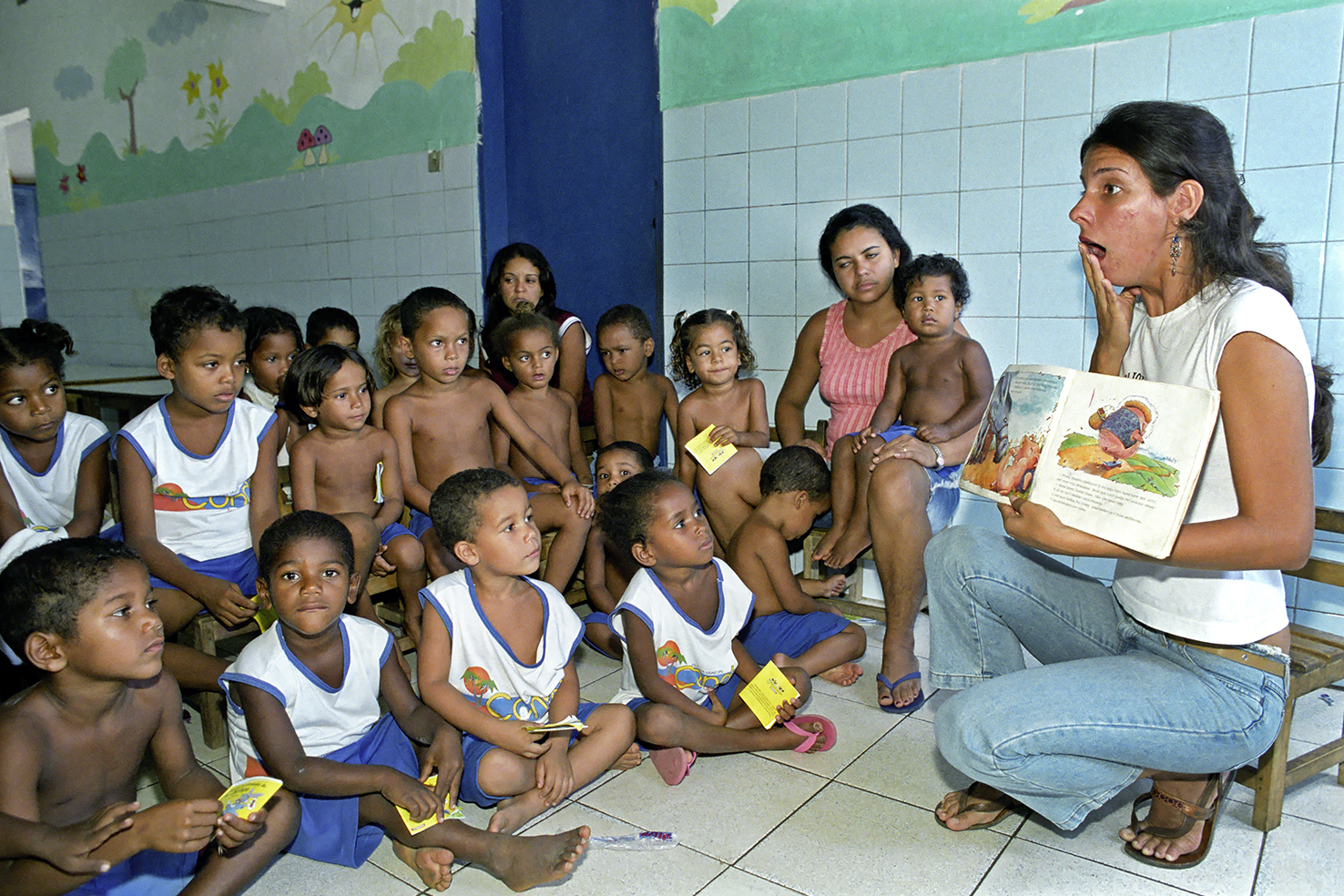The Promise of Quality Preschool & Health Promotion in Brazil
Dr. Maria Conceição do Rosário is an associate professor at the Federal University of Sao Paulo and adjunct professor at the Yale Child Study Center. She is a child psychiatrist and currently coordinates the Early Childhood Attention Program (PAPI) in Brazil, an interdisciplinary team of people dedicated to developing and implementing strategies for promoting early childhood development by empowering caregivers. Her host is Rafael Perez-Escamilla, Professor of Epidemiology and Public Health, Director of the Office of Public Health Practice, and Director of the Global Health Concentration at the Yale School of Public Health.

The Promise of Quality Preschool & Health Promotion in Brazil
Guest, Maria Conceição do Rosário, MD, Federal University of São Paulo
Rafael Perez-Escamilla: Hello everyone! I am Rafael Perez-Escamilla, Professor of Epidemiology and Public Health and Director of the Office of Public Health practice and the Global Health concentration at the Yale School of Public Health. Today, I am very proud on behalf of the Early Childhood Peace Consortium to have the pleasure and honor to be speaking with Professor Maria Conceição do Rosário. Dr. Rosário is an associate professor at the Federal University of Sao Paulo and adjunct professor at the Yale Child Study Center. She is a child psychiatrist and currently coordinates the early childhood attention program (PAPI), an interdisciplinary team of people dedicated to developing and implementing strategies for promoting early childhood development.
Dr. Rosario, welcome and thank you so much for joining us.
Maria Conceição do Rosário: Thank you Dr. Escamilla, it’s a pleasure being here and it’s an honor being interviewed by you. Thank you very much.
Perez-Escamilla: Thank you. I guess the best place to start is at the beginning, right? So, please tell our audience how you became interested in early childhood development.
Conceição do Rosário: Well, I am a child psychiatrist and during my whole professional life, I have seen children who already had some sort of symptoms or disorder and around 6 years ago, I started to become very interested in prevention strategies so that I could try to reduce the severity of these conditions and improve these children’s lives. Very soon after that, it became very clear to me that the right place to start would not be only with prevention but with health promotion. As the World Health Organization proposes, “there is no health without mental health”, I started getting very interested in trying to include mental aspects into developmental and health promotion issues and this led me to the early years of life and early childhood development.
Perez-Escamilla: Given how much we know now about the importance of mental health in explaining the global burden of disease, I think the topic we are addressing today is extremely timely. So broadly speaking, what made you decide to implement a mother support program and a teacher support program in Brazil?
Conceição do Rosário: Well, in the last years, Brazil has made incredible improvement in terms of reducing the poverty levels. Unfortunately, despite all the governmental initiatives and all the programs they implemented, there are still far too many children in Brazil suffering from abuse, neglect, poor nutrition, poor social and economic conditions, and from exposure to domestic and community violence. Brazil is one the countries with the highest inequality indexes, so we suffer a lot from direct and also indirect violence. So, because of these issues, I started looking into all the literature on interventions on early childhood and they all show that early childhood development programs are a very promising approach to mitigate all the serious and terrible effects of living in such fragile contexts. The idea is to empower the caregivers so that they are able to promote child development.
Perez-Escamilla: Thank you for your very clear explanation as to how and why you are approaching both the mothers and the teachers of early childhood development. So, in the interest of our audience, could you please describe in more detail the mother support program?
Conceição do Rosário: Well, the mother support program is based on the mother-child support program from the AÇEV Foundation in Turkey. This foundation developed some strategies for empowering mothers to work with their children. They have been implementing this program all over Turkey for the last 30 years so they have a lot of data showing how effective the mother support program can be in trying to boost a child’s cognitive, physical, and social development. In Brazil, the mother support program will be implemented as a group based program lasting 13 weeks and will have weekly meetings with the mothers that last approximately two hours. All of the sessions are focused on addressing issues related to child development, parenthood and parenting skills, as well as interpersonal communication skills. We also discuss some topics related to democratic conflict resolution, self expression and trying to understand your emotions and express your emotions to children, how to exercise active listening, and how to deal with positive and negative behavior of the children. The sessions also include sessions related to healthy diet and health promotion and how the mothers can be active players in their family, the school, and the community. From what we are seeing, many mothers are trying to deal with the behaviors of the children with verbal or psychological aggressive expressions and they don’t even realize that these are types of violence.
Perez-Escamilla: Thank you, it sounds like a super powerful way to empower the mothers and the families and offer a very nurturing environment for their children to grow and thrive with all the stimuli they need. As a maternal child nutritionist, I have to say that I am delighted to hear that your intervention also covers aspects of feeding and nutrition. Now, what about the teachers? I am assuming that we are talking about preschoolers, children that are between the ages of three and five, can you tell us about the support program for the teachers?
Conceição do Rosário: The idea for the teacher support program came from some data in Brazil showing that the number of daycare centers and preschools increased a lot in Brazil, so there is this bigger coverage and there was a law that was approved in 2012 that obliges all cities to provide preschool education for children who are four and five years old. However, despite all these attempts to increase the number of preschools, the data is showing that the quality of the preschools still needs a lot of improvement and that the children are not doing as well in elementary school as expected. So, we started looking into these data to see what was going on and we did some focal group discussions with the teachers and we realized that it was not only a lack of knowledge related to developmental issues, it was mainly a great difficulty for the teachers on how to deal with children’s difficult behaviors and children’s emotions as well as how to deal with their own emotions and their own stress levels. The data also showed that the teachers in Brazil have high anxiety and depression scores that they have very high rates of burnout syndrome so we decided to implement this program in order to empower the teachers so that they can reduce the levels of stress and they are better equipped to deal with their own emotions, the children’s emotions, and their behaviors. The topics are similar to the mother support program but focused on classroom management. We start discussing the teacher’s roles and stress reduction strategies and then we move on to how to promote children’s development, how to listen to children and self expression for the teachers, how to deal with positive and negative behaviors within the classroom. We also talk about democratic conflict resolution and healthy diet and health promotion and there’s also a session on the relationship between school, family, and community because we noticed that there was a lot of tension between the parents and the teachers most of the time.
Perez-Escamilla: Very interesting evidence based approach to support the teachers to improve early childhood development. I think given the enormous push through the sustainable development goals to provide universal access to preschool education, your program and the teacher’s aspect of your program, could not be more timely. I want to congratulate you on the very nice complementary approach you are using with the mothers and the teachers. Now, Dr. Rosario, as you know, our audience is very interested in peace promotion. So, what do your programs have to do with violence prevention and peace promotion?
Conceição do Rosário: Recently, many articles have shown that early childhood interventions are very important because they can help mitigate the impact of our early experiences and these diverse early experiences can cause many consequences not only in childhood, but also in adulthood. Such consequences can lead to poor health and noncommunicable diseases such as obesity and cardiovascular diseases, poor education attainment, and the data is also showing that it can lead to high criminality and poverty rates which can turn into risk factors for domestic and community violence. So, the best way to deal with domestic violence and community violence is starting as early as possible, trying to provide children with a very nurturing and caring environment and a family that is supportive and does not have domestic violence issues and is very attentive to not only the child’s physical needs, but also to their social, emotional, and psychological needs. So by helping the mothers, fathers, and the teachers on how to provide a nurturing care, we have the hypothesis that this will stop this vicious cycle because if a child is exposed to a violent environment, then the child is more likely to become a violent person when he or she becomes an adult. This program helps prevent violence by trying to avoid that. Also, teaching how to resolve conflict in a democratic way is one of the most interesting but also the most difficult aspect I find in both programs and actually in our lives. What we see is that people don’t realize when they are in a conflict situation and they do not know how to deal with it. So, these programs really help promote healthier and less violent environments for the children.
Perez-Escamilla: Absolutely. It sounds like your approach will very likely lead to stable environments in many households and caregiving environments that the children receive in Brazil. So, my utmost respect for your work. I have one last question for you. Why the preschool years? Why invest in the preschool years? Why not wait until later on to do this work?
Conceição do Rosário: Well, this is a very interesting question. There are economical reasons as well as social and emotional reasons. Speaking to the economical reason, data has shown that the earlier the investment, the higher the efficacy and the less that it will cost in the future. So, as a governmental investment, it is really important to spend as little as possible, so investing in the early years is related to that. The preschool years are thought to be a critical window for a child’s intellectual, social, and emotional development. Preschool programs can be especially important for children who have parents with a limited amount of education, so investing in the preschool years is a way to reduce inequality. It gives the child a chance of having another source of nurturing care and this is especially important for very poor people and also for families that are not able to provide this nurturing environment. Another reason, especially in Brazil, is that 90% of the programs are either focused on the first 1,000 days or later on in life so there is this gap in terms of offering programs for the preschool years which is why I chose to invest in years three to six. Also, related to education, the preschool years are key to prepare the children to start elementary school. So, the school aspect is really important and there are some programs that have shown that by investing in quality preschools, the number of students that are expelled from high school is reduced later on and it also increases a lot of the number of children that reach college level education. So, that is mainly why.
Perez-Escamilla: Very persuasive reasons. There is no doubt that investing in the preschools years has a very strong potential to go a long way in preventing violence and promotion peace globally. Well, Dr. Rosario, thank you again for coming in and speaking today, we thank you so much for the work you are doing for the children, their families, and their communities in the beautiful nation of Brazil and we hope that your work ends up getting replicated in many other parts of the world.
Conceição do Rosário: Thank you very much for being here and being the interviewer this afternoon, and it is really a pleasure to speak for this wonderful initiative that is the early childhood peace consortium. Thank you very much.
- Obsessive-compulsive symptoms are associated with psychiatric comorbidities, behavioral and clinical problems: a population-base
- High risk cohort study for psychiatric disorders in childhood: rationale, design, methods and preliminary results. International
- Obsessive-compulsive symptom dimensions in a population-based, cross-sectional sample of school-aged children
- Obsessive-compulsive symptom dimensions correlate to specific gray matter volumes in treatment-naïve patients
- Validation of the University of São Paulo Sensory Phenomena Scale: initial psychometric properties
- Four-factor structure of obsessive-compulsive disorder symptoms in children, adolescents, and adults
- The Dimensional Yale-Brown Obsessive-Compulsive Scale (DY-BOCS): an instrument for assessing obsessive-compulsive symptom dimens
- A multidimensional model of Obsessive-Compulsive Disorder
- Obsessive-compulsive symptom dimensions in affected sibling pairs diagnosed with Gilles de la Tourette Syndrome
- Genomewide scan of hoarding in sib pairs in which both sibs have Gilles de la Tourette syndrome
JOIN THE CONVERSATION
For breaking news and to stay connected, follow us on social media. Sign up to get our E-News delivered straight to your inbox.



